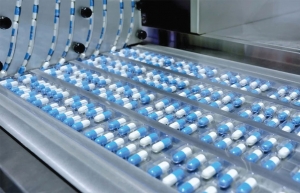New pharma rules to offer direct and indirect gains
What are the most significant changes in the draft amendments to the Law on Pharmacy?
 |
| Dr. Le Viet Dung, deputy director of the Ministry of Health’s Drug Administration of Vietnam |
The Law on Pharmacy 2016 replaced the 2005 law, marking an important development in completing the pharmaceutical legal system in Vietnam in accordance with international integration. Vietnam’s pharmaceutical industry has developed strongly since then, reaching level 3.5 according to the classification scale of the World Health Organization, and having a market value in the top three in ASEAN.
However, practical implementation proved that some contents of the 2016 law are no longer consistent with management requirements, and are causing difficulties for pharmaceutical production and business activities, affecting the supply of drugs, especially in urgent conditions such as the pandemic.
To solve these problems, practical requirements must be in line with the development trend of the pharmaceutical industry, and the Ministry of Health has worked on the draft amendments to the law amending and supplementing a number of articles to this law.
The amendments and supplements focus on a number of regulations. In terms of layout, the draft amended law includes over 40 clauses, concentrating deeply on the state’s policies on pharmacy regulations, trading of drugs and medicinal ingredients, the registration, export, and import of drugs, recalls and advertising, quality and price management, and more.
The changes focus on regulations on pharmaceutical industry development policies, reorganisation of the business and distribution system of drugs and medicinal ingredients, regulations on rights and responsibilities of foreign-invested pharmaceutical businesses, and the authority to grant pharmacy practice certificates.
What do the draft amendments say about drug store chains?
In recent times, the development of society has led to that of a number of new pharmaceutical businesses, with pharmacy chains taking shape and increasing their position and presence in distributing drugs to patients/consumers in the non-hospital channel.
The 2016 law had a policy to develop the pharmacy chain by encouraging technology transfer in drug production, developing distribution networks and pharmacy chains, preserving and supplying drugs in a professional manner, and meeting the people’s drug needs. However, the conditions and benefits of drug store chain businesses have not been specifically regulated to encourage this business model.
Pharmacy chains have been gradually becoming a model in Vietnam’s drug supply chain. Among them, a number of pharmacy chains are developing strongly with a wide network and high specialisation.
With such a wide network, pharmacies in the chain are currently still operating individually and independently, leading to increased costs for administrative and business management, without creating better conditions and without open legal foundation to encourage their development. Therefore, in the draft amendments, terminology and related contents on conditions for the drug store chain business model have been added. The addition of specific regulations on pharmacy chains aims to unify management methods, improve specialisation, and modernise the network of drug retail establishments. Articles 17a and 47a stipulate basic characteristics of pharmacy chains that independent retail establishments do not have.
Regarding organisational structure, chains consists of two basic components: chain operators and pharmacies in the chain. In regard to these conditions, the pharmacy chain operates under a unified management mechanism. All activities of the pharmacies in the chain are regulated by the operator of the chain, with specific conditions for the chain operator and the conditions of the pharmacies in the chain.
Regarding rights and responsibilities, the chain operator manages all activities related to the supply, circulation, storage, and preservation of drugs and data of pharmacies in the chain, while full responsibility for the operations of pharmacies in the chain.
The draft also stipulates the rights of chain operators with direct benefits such as rotating drugs between central warehouses and pharmacies, and among pharmacies with similar business scope in the chain. In addition to direct benefits, businesses organising and operating the pharmacy chain may have derivative benefits, such as negotiating to buy drugs to supply to all pharmacies in the chain at reasonable prices, and building brand reputation.
How will the proposed legal improvements benefit individuals and businesses?
The biggest goal of recognising and regulating the business model of pharmacy chain is to specialise and modernise the drug retail system. Currently, the country has more than 60,000 drug retail establishments with a different scale and supply of drugs.
Specialisation is expected to improve drug quality significantly. For example, allowing the transfer of drugs among pharmacies in the chain will prevent the slow circulation of drugs, which can affect drug quality.
Due to the requirement about unified and consistent management in the chain, establishments are required to apply IT in management. This is necessary for retrieving information about the origin of drugs and managing customer information, thus helping make business activities more transparent.
They also have a competitive advantage in price because they have to supply drugs to many pharmacies in the chain, so they have the opportunity to negotiate prices with suppliers to buy drugs, thus being able to supply to all pharmacies in the chain at reasonable prices.
It is expected that when pharmacy chains are formed and developed, it will create competitiveness, requiring traditional pharmacies to innovate and improve service quality, and eliminating small and fragmented businesses.
On top of all the aforementioned changes, people will enjoy good services with quality medicines and reasonable prices.
 | The way out for pharma distribution Vietnam needs to open up its pharmaceutical distribution and logistics activities, but such changes will take time. |
 | Fluctuations felt in pharma retail sphere The race in Vietnam’s pharmaceutical retail industry is becoming a tough arena for major players. |
 | Global pharma expects bumper year Increasing footprints in Vietnam in 2023, multinational corporations continue to eye stronger local partnerships to bring more new innovative medicines and vaccines to the local market in 2024 and beyond. |
What the stars mean:
★ Poor ★ ★ Promising ★★★ Good ★★★★ Very good ★★★★★ Exceptional
Related Contents
Latest News
More News
- Masan Consumer names new deputy CEO to drive foods and beverages growth (February 23, 2026 | 20:52)
- Myriad risks ahead, but ones Vietnam can confront (February 20, 2026 | 15:02)
- Vietnam making the leap into AI and semiconductors (February 20, 2026 | 09:37)
- Funding must be activated for semiconductor success (February 20, 2026 | 09:20)
- Resilience as new benchmark for smarter infrastructure (February 19, 2026 | 20:35)
- A golden time to shine within ASEAN (February 19, 2026 | 20:22)
- Vietnam’s pivotal year for advancing sustainability (February 19, 2026 | 08:44)
- Strengthening the core role of industry and trade (February 19, 2026 | 08:35)
- Future orientations for healthcare improvements (February 19, 2026 | 08:29)
- Infrastructure orientations suitable for a new chapter (February 19, 2026 | 08:15)

 Tag:
Tag:


















 Mobile Version
Mobile Version